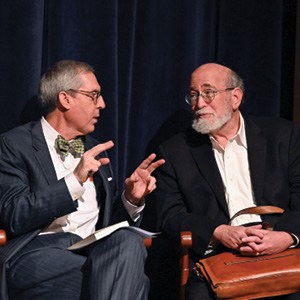Dennis Manning, Norfolk Academy headmaster, and Rabbi Joseph Telushkin.
If Rabbi Joseph Telushkin could change America in just one way, he would start at home with the words that parents speak to their children.
Many children earn praise for things like academic achievement, athletics, artistic performance, and even their physical appearance. As he ticked down the list of items that garner praise, the audience of Norfolk Academy Upper School students seemed to agree with his assessment.
However, these should not be the main things that earn laudatory words. “I would have parents reserve their highest praise of their children for kind acts,” he said. “Goodness is the very thing to brag about. We need to think in these terms and express it.”
This was just the beginning of a cascade of lessons on speaking with kindness that unfolded in Rabbi Telushkin’s 40-minute talk to Upper School students.
An internationally renowned religious leader, teacher, author, and speaker, Rabbi Telushkin came to Norfolk Academy through the support of the United Jewish Federation of Tidewater. He was in the area for UJFT’s Tidewater Together program, a series of speaking engagements at synagogues on a variety of topics with the theme of using words intentionally, even for jokes—his final talk was entitled, The 50 Best Jewish Jokes and What They Say About the Human Condition.
At Norfolk Academy, he drew on themes from a newly revised version of his 1996 book, Words That Hurt, Words that Heal: How the Words You Choose Shape Your Destiny. A call to action for greater kindness and consideration in how we use our voices as we engage with others, the book was written before the explosion of the internet and social media. “When I wrote the book in 1996, I said, ‘Public discourse in America can’t get any worse,’” he observed, adding drily, “A rabbi is not a prophet.”
His speech touched on the language used with those we care about most—our family. He asked, “How many people wish they had better control of their temper?” After observing a few hands, he then told a story about his own temper as a young father (he is now in his 70s), and how his children’s reaction to a question that he posed to a synagogue congregation—“How many of you have grown up in a household with someone who has a temper?”—taught him that he needed to learn better self-control.
He spoke about the “ethics of anger,” and offered a Rule #1 for how to respond wisely. “Restrict your expression of anger to the incident that provoked it,” he said. “You are then less likely to say the sorts of things that provoke an irrevocable break. Don’t use words like ‘always’ or ‘never,’ because then the person can’t repair it. An entire life can’t be repented for, but a person can repent for a single act.”
Rabbi Telushkin ended his speech with a challenge: “Go 24 hours without saying anything unkind about, or to, someone.” To accomplish such a task may be harder than it seems, but it is well worth the effort, because it leads to more kindness, he said. “The greatest battle that any person has to fight is the fight for their good character.”
Esther Diskin

